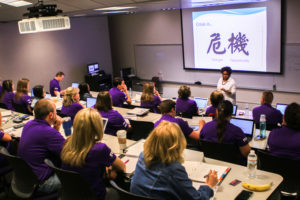Join us at TCU for the Certified Public Communicator® Program
The Certified Public Communicator® Program at TCU is a post-baccalaureate, graduate-level residential program for two summers (one week each in summer 1 and summer 2), plus a two-day winter session with strategic communication professors from TCU’s Department of Strategic Communication.
The Certified Public Communicator® Program at TCU offers leadership training and rigorous post-baccalaureate education for public information managers and communication professionals working for cities, counties, school districts, and other public and public-private agencies and organizations. With the Texas Association of Municipal Information Officers as a partner, the program encompasses the complexities, challenges, and importance of public communication to citizens and stakeholders.
The cost for the 95-hour program—including tuition, some meals and course materials—is $3,450. Click here to register for the next open CPC cohort.
What You’ll Learn
The Certified Public Communicator® Program builds successful and ethical leaders through experiential learning, strategic communication plan-building, theoretical instruction, case studies, and other interactive instruction led by strategic communication faculty members from TCU, as well as proven and engaging leaders from the public-service sector.
Students graduate from the program with three-year communication plans and policies for their organizations, which are put into action during the year with time for testing and revisions before graduation. In addition, students work with their professional cohort of colleagues, attend keynote presentations with other communication professionals, and engage in a year-long process of professional growth and goal-setting. Organizations that send their managers and communicators to the program receive tested communication plans including social media policies, research-based strategies and tactics, crisis communication plans, and more.
Course Content

Amiso George, an associate professor of Strategic Communication, teaches a classroom full of CPC students.
Subject areas for the first summer will be theory-focused, with the second summer’s focus on application. Both summers will present an integrated communication approach that is infused with ethics and public affairs perspectives.
Summer 1 (one week; 40 hours of in-class instruction): Three approaches to public communication will be presented: Public relations, advertising, and marketing theory. Public relations instruction will include reputation management, media relations, crisis communication, and internal communication tracks. Advertising instruction will include tracks in creative, channels, metrics, and digital media. Marketing instruction will focus on branding, audiences, and customer relations. Tying these areas together will be discussion of the strategic communication plan, which will be assigned to participants. Students would submit a schedule for enacting discussion, approval, and use of the plan before summer 2.
Winter 1 (two days; 15 hours of in-class instruction): Students will submit and discuss final drafts of strategic communication plans, based on timetables of students’ employers and approval processes. (This is a two-day program in January, between the summer residential weeks of the program. Participants will pay for their own lodging in a nearby hotel in Fort Worth for one night, if needed. All instruction, some meals, and course materials will be provided, as part of the overall tuition.)
Summer 2 (one week; 40 hours of in-class instruction): Enactment strategies, revisions to plans, and measurement will serve as the focus during the first day of this week. Further instruction will cover practice/application on these topics: law, digital, IT and database use, research, standards and policies for communication, writing and design for varied communication forms, and campaigns.
Need more information? Please download a one-page PDF by clicking here.
